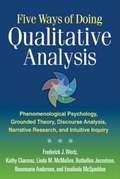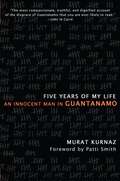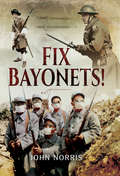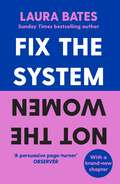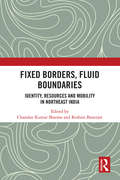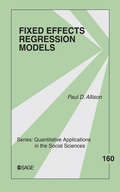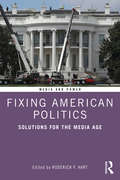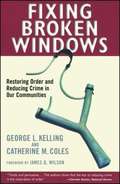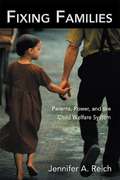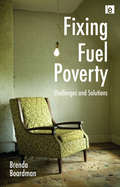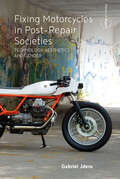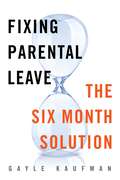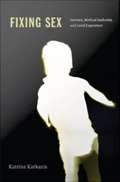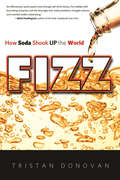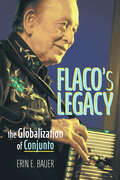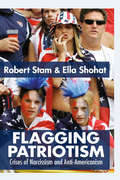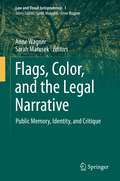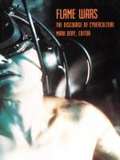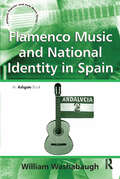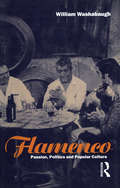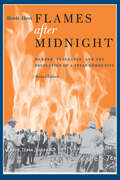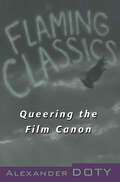- Table View
- List View
Five Ways of Doing Qualitative Analysis
by Kathy Charmaz Frederick WertzThis unique text provides a broad introduction to qualitative analysis together with concrete demonstrations and comparisons of five major approaches. Leading scholars apply their respective analytic lenses to a narrative account and interview featuring "Teresa," a young opera singer who experienced a career-changing illness. The resulting analyses vividly exemplify what each approach looks like in action. The researchers then probe the similarities and differences among their approaches; their distinctive purposes and strengths; the role, style, and subjectivity of the individual researcher; and the scientific and ethical complexities of conducting qualitative research. Also included are the research participant's responses to each analysis of her experience. A narrative account from another research participant, "Gail," can be used by readers to practice the kinds of analysis explored in the book.
Five Years of My Life: An Innocent Man in Guantanamo
by Murat KurnazIn October 2001, nineteen-year-old Murat Kurnaz traveled to Pakistan to visit a madrassa. During a security check a few weeks after his arrival, he was arrested without explanation and for a bounty of $3,000, the Pakistani police sold him to U.S. forces. He was first taken to Kandahar, Afghanistan, where he was severely mistreated, and then two months later he was flown to Guantanamo as Prisoner #61. For more than 1,600 days, he was tortured and lived through hell. He was kept in a cage and endured daily interrogations, solitary confinement, and sleep deprivation. Finally, in August 2006, Kurnaz was released, with acknowledgment of his innocence. Told with lucidity, accuracy, and wisdom, Kurnaz's story is both sobering and poignant--an important testimony about our turbulent times when innocent people get caught in the crossfire of the war on terrorism.
Fix Bayonets!
by John NorrisThe bayonet is an essential item of a soldier's kit even on today's modern hi-tech battlefield. This work examines the origins of this humble weapon and the 'cult of the bayonet' as espoused by the Russian General Alexander Suvorov who asserted that The bullet misses, the bayonet does not. The first bayonets appeared in France in the early 17th century and soon they were being used by every army in Europe. The author examines the spread of this simple weapon and how it led to fundamental changes being made in battlefield tactics. Over 300 years later, in the age of hi-tech warfare and weapons of mass destruction, the bayonet is still in service with armies around the world. British and US forces in Afghanistan regularly have their bayonets fixed. Fix Bayonets illustrates how tactics changed and the design of the weapon, although fundamentally the same, has evolved over the centuries.Much myth and legend surrounds the subject of bayonet charges and the weapon has become an icon of defiance and the determination to do whatever it takes to win. The author examines evidence for the reality of such actions. How did the ordinary soldier feel to be told 'fix bayonets'? John Norris draws on personal accounts of soldiers using bayonets in combat from the Napoleonic and Crimean Wars, various Colonial campaigns, through the World Wars, Falklands War and into the 21st century in Afghanistan. In so doing he explains the seemingly anachronistic survival of this simple weapon on the modern battlefield.
Fix the System, Not the Women
by Laura Bates'An astute and persuasive page-turner' OBSERVER'Powerful&’ SUNDAY TIMES'I challenge any man to read this and still deny there's a problem' NEW STATESMAN _____________________________________________________ Too often, we blame women. For walking home alone at night. For not demanding a seat at the table. For not overcoming the odds that are stacked against them. This distracts us from the real problem: the failings and biases of a society that was not built for women. In this explosive book, feminist writer and activist Laura Bates exposes the systemic prejudice at the heart of five of our key institutions.EducationPoliticsMediaPolicingCriminal justice Combining stories with shocking evidence, Fix the System, Not the Women is a blazing examination of sexual injustice and a rallying cry for reform. ________________________________________________'A blistering manifesto for change' Dr PRAGYA AGARWAL'I am in awe of Laura Bates . . . her writing is nothing short of perfect' SOFIE HAGEN, author of Happy Fat&‘Finish the book furious – before rallying for the next fight&’ GRAZIA Latest Must-Reads
Fixed Borders, Fluid Boundaries: Identity, Resources and Mobility in Northeast India
by Reshmi Banerjee Chandan Kumar SharmaThis book provides an understanding of the challenges in Northeast India in terms of the nature of flows and ruptures in the daily lives of people. It brings together multiple and interconnected issues of identity, development, environment, migration, land alienation and policy impacts to the forefront. Northeast India’s history is affected both by internal dynamic processes, as are its linkages with adjoining countries, marked by a fluid movement of people and goods across porous borders. The book explores how the region has emerged as a resource frontier for the global markets, yet its resource mobilization has led to disparity within the region. The volume discusses key themes concerning the region such as the processes of development and people’s resistance; underdevelopment in the peripheral areas; resource flow and conflict; community response and local agency; state and customary practices; politics of land and citizenship; development-induced dispossession; human mobility, immigration and conflict; the notion of "outsiders"; inter-state border conflict; and spatial connections. Rich in empirical data, the volume will be relevant and useful for students and researchers of development studies, Northeast India studies, sociology, political science, border and migration studies, public policy, peace and conflict studies, as well as practitioners and policymakers.
Fixed Effects Regression Models
by Paul D. AllisonThis book demonstrates how to estimate and interpret fixed-effects models in a variety of different modeling contexts: linear models, logistic models, Poisson models, Cox regression models, and structural equation models. Both advantages and disadvantages of fixed-effects models will be considered, along with detailed comparisons with random-effects models. Written at a level appropriate for anyone who has taken a year of statistics, the book is appropriate as a supplement for graduate courses in regression or linear regression as well as an aid to researchers who have repeated measures or cross-sectional data.Learn more about "The Little Green Book" - QASS Series! Click Here
Fixing American Politics: Solutions for the Media Age (Media and Power)
by Roderick P. HartFixing American Politics: Solutions for the Media Age brings together original chapters from 34 noted scholars from two disciplines – political science and communication – asked to identify the most pressing problems facing the American people and how they can be solved. Authors address the questions succinctly and directly, with their favored solutions featured in chapter titles that exhort and inspire. The book gives the reader much to think about and debate. Should news outlets be funded with public money rather than by private enterprise? Are the new social media a boon or a bane to political elections? Is the American past dead, or is it living once again? Do churchgoers and environmentalists have anything to discuss? Is the FCC doing its job? Can political ads be made less toxic? Should Fox News be "cancelled?" Should cancel cultures be cancelled? Can we become more civil to one another and, if so, how? Fixing American Politics poses all the best questions … and offers some concrete answers as well. This book is perfect for students, citizens, the media, and anyone concerned with contemporary challenges to civic life and discourse today.
Fixing Broken Windows: Restoring Order and Reducing Crime in Our Communities
by George L. Kelling Catherine M. ColesBased on a groundbreaking theory of crime prevention, this practical and empowering book shows how citizens, business owners, and police can work together to ensure the safety of their communities. George Kelling, one of America’s leading criminologists, has proven the success of his method across the country, from the New York City subways to the public parks of Seattle. Here, Kelling and urban anthropologist and lawyer Catherine Coles demonstrate that by controlling disorderly behavior in public spaces, we can create an environment where serious crime cannot flourish, and they explain how to adapt these effective methods for use in our own homes and communities.
Fixing Families: Parents, Power, and the Child Welfare System (Perspectives on Gender)
by Jennifer A. ReichIn Fixing Families, Jennifer Reich takes us inside Child Protective Services for an in-depth look at the entire organization. Following families from the beginning of a case to its discharge, Reich shows how parents negotiate with the state for custody of their children, and how being held accountable to the state affects a family.
Fixing Fuel Poverty: Challenges and Solutions
by Brenda BoardmanSince its publication in the early 90s, Brenda Boardman's Fuel Poverty has been the reference text for those wishing to learn about this complex subject. In this, its successor, she turns a critical eye to the new millennium and finds that the situation, while now more widely recognised, is far from having improved. The book begins by discussing the political awakening to the issue and exploring just who constitutes the fuel poor. It examines the factors that contribute to fuel poverty - low incomes, high fuel prices and poor quality housing - and looks at and evaluates the policies that have been employed to help reduce the problem. The latter part presents a detailed set of proposals based around long-term improvements in the housing stock that must be employed if we are to avoid a dire situation continuing to get worse. Based on detailed analysis of the situation in the UK, the growth of fuel poverty (sometimes called energy poverty) in other countries and the new focus in European policy makes the book timely and provides important lessons for those who now have to produce policies to tackle the issues.
Fixing Motorcycles in Post-Repair Societies: Technology, Aesthetics and Gender (Politics of Repair #3)
by Gabriel JderuMost social science studies on automobility have focused on the production, usage, identity construction and aesthetic improvements of personal means of transportation. What happens if we shift the focus to the labour, knowledge and social relations that go into the unavoidable moments of maintenance and repair? Taking motorcycling in Romania as an ethnographic entry point, this book documents how bikers handle the inevitable moments of malfunction and breakdown. Using both mobile and sedentary research methods, the book describes the joys and troubles experienced by amateur mechanics, professional mechanics and untechnical men and women when fixing bikes.
Fixing Parental Leave: The Six Month Solution
by Gayle KaufmanA real-world solution for parental leave that promotes gender equality at work and at homeWhat do Papua New Guinea, Suriname, and the United States have in common? These three nations are the only ones that do not offer some form of parental leave to new parents. The US lags far behind the rest of the world on this important issue, raising questions about our commitment to gender equality and the welfare of our families.In Fixing Parental Leave, Gayle Kaufman takes an in-depth look at parental leave policies in the US, the UK, and Sweden, and evaluates the benefits and drawbacks of leave policies in each country. She finds that there is more to parental leave policies than whether a country provides time off around the birth or adoption of a child. While most policies are designed to help women return to work, this is only half of the puzzle. The second half requires men to be meaningful partners by encouraging them to take equal time at home.Ultimately, Kaufman arrives at a rational solution that will promote gender equity through a policy that enables parents at companies of all sizes to spend six months with their new child.
Fixing Sex: Intersex, Medical Authority, and Lived Experience
by Katrina KarkazisWhat happens when a baby is born with "ambiguous" genitalia or a combination of "male" and "female" body parts? Clinicians and parents in these situations are confronted with complicated questions such as whether a girl can have XY chromosomes, or whether some penises are "too small" for a male sex assignment. Since the 1950s, standard treatment has involved determining a sex for these infants and performing surgery to normalize the infant's genitalia. Over the past decade intersex advocates have mounted unprecedented challenges to treatment, offering alternative perspectives about the meaning and appropriate medical response to intersexuality and driving the field of those who treat intersex conditions into a deep crisis. Katrina Karkazis offers a nuanced, compassionate picture of these charged issues in Fixing Sex, the first book to examine contemporary controversies over the medical management of intersexuality in the United States from the multiple perspectives of those most intimately involved.Drawing extensively on interviews with adults with intersex conditions, parents, and physicians, Karkazis moves beyond the heated rhetoric to reveal the complex reality of how intersexuality is understood, treated, and experienced today. As she unravels the historical, technological, social, and political forces that have culminated in debates surrounding intersexuality, Karkazis exposes the contentious disagreements among theorists, physicians, intersex adults, activists, and parents--and all that those debates imply about gender and the changing landscape of intersex management. She argues that by viewing intersexuality exclusively through a narrow medical lens we avoid much more difficult questions. Do gender atypical bodies require treatment? Should physicians intervene to control the "sex" of the body? As this illuminating book reveals, debates over treatment for intersexuality force reassessment of the seemingly natural connections between gender, biology, and the body.
Fizz: How Soda Shook Up the World
by Tristan DonovanThis social, cultural, and culinary history charts soda's remarkable, world-changing journey from awe-inspiring natural mystery to ubiquity. Off-the-wall and offbeat stories abound, including how quack medicine peddlers spawned some of the world's biggest brands, how fizzy pop cashed in on Prohibition, how soda helped presidents reach the White House, and even how Pepsi influenced Apple's marketing of the iPod. This history of carbonated drinks follows a seemingly simple everyday refreshment as it zinged and pinged over society's taste buds and, in doing so, changed the world.
Flaco’s Legacy: The Globalization of Conjunto (Music in American Life)
by Erin E. BauerA combination of button accordion and bajo sexto, conjunto originated in the Texas-Mexico borderlands as a popular dance music and became a powerful form of regional identity. Today, listeners and musicians around the world have embraced the genre and the work of conjunto masters like Flaco Jiménez and Mingo Saldívar. Erin E. Bauer follows conjunto from its local origins through three processes of globalization--migration via media, hybridization, and appropriation--that boosted the music’s reach. As Bauer shows, conjunto’s encounter with globalizing forces raises fundamental questions. What is conjunto stylistically and socioculturally? Does context change how we categorize it? Do we consider the music to be conjunto based on its musical characteristics or due to its performance by Jiménez and other regional players? How do similar local genres like Tejano and norteño relate to ideas of categorization? A rare look at a fascinating musical phenomenon, Flaco’s Legacy reveals how conjunto came to encompass new people, places, and styles.
Flag, Nation and Symbolism in Europe and America
by Thomas Hylland Eriksen Richard JenkinsAlthough the symbolic and political importance of flags has often been mentioned by scholars of nationalism, there are few in-depth studies of the significance of flags for national identities. This multi-disciplinary collection offers case studies and comparisons of flag history, uses and controversies. This book brings together a dozen scholars, from varying national and disciplinary backgrounds, to offers a cluster of close readings of flags in their social contexts, mostly contemporary, but also historical. Case studies from Denmark, England, Northern Ireland, Norway, Sweden, and the United States explore ways in which flags are contested, stir up powerful emotions, can be commercialised in some contexts but not in others, serve as quasi-religious symbols, and as physical boundary markers; how the same flag can be solemn and formal in one setting, but stand for domestic bliss and informal cultural intimacy in another.
Flagging Patriotism: Crises of Narcissism and Anti-Americanism
by Ella Shohat Robert StamThe question "Why do they hate us?" is one of the most oft-cited puzzles of contemporary American affairs, yet it’s not clear to whom "they" or "us" refers, nor even what "hate" means. In this bold new work, Ella Shohat and Robert Stam take apart the "hate discourse" of right-wing politics, placing it in an international context. How, for example, do other nations love themselves, and how is that love connected to their attitudes toward America? Is love of country "monogamous" or can one love many countries? When can a country’s self-love be a symptom of self-hatred? Drawing upon their extensive experience with South American, European, and Middle Eastern societies, the authors have written a long engagement with a problem that refuses to go away. Flagging Patriotism considers these complex features of "being patriotic," and in so doing insists that the idea of patriotism, instead of being rejected or embraced, be accorded the complex identity it possesses.
Flags, Color, and the Legal Narrative: Public Memory, Identity, and Critique (Law and Visual Jurisprudence #1)
by Anne Wagner Sarah MarusekThe book deals with the identification of “identity” based on culturally specific color codes and images that conceal assumptions about members of a people comprising a nation, or a people within a nation. Flags narrate constructions of belonging that become tethered to negotiations for power and resistance over time and throughout a people’s history. Bennet (2005) defines identity as “the imagined sameness of a person or social group at all times and in all circumstances”. While such likeness may be imagined or even perpetuated, the idea of sameness may be socially, politically, culturally, and historically contested to reveal competing pasts and presents. Visually evocative and ideologically representative, flags are recognized symbols fusing color with meaning that prescribe a story of unity. Yet, through semiotic confrontation, there may be different paths leading to different truths and applications of significance. Knowing this and their function, the book investigates these transmitted values over time and space. Indeed, flags may have evolved in key historical periods, but contemporaneously transpire in a variety of ways. The book investigates these transmitted values: Which values are being transmitted? Have their colors evolved through space and time? Is there a shift in cultural and/or collective meaning from one space to another? What are their sources? What is the relationship between law and flags in their visual representations? What is the shared collective and/or cultural memory beyond this visual representation? Considering the complexity and diversity in the building of a common memory with flags, the book interrogates the complex color-coded sign system of particular flags and their meanings attentive to a complex configuration of historical, social and cultural conditions that shift over time.Advance Praise for Flags, Color, and the Legal Narrative"In an epoch of fragmentation, isolation and resurgent nationalism, the flag is waved but often forgotten. The flag, its colors, narratives, shape and denotations go without saying. The red flag over China, the Star-Spangled Banner, the Tricolore are instantly recognisable and over determined, representing a people, a nation, a culture, languages, legacies, leaders. In this fabulous volume flags are revealed as concentrated, complex, chromatic assemblages of people, place and power in and through time. It is in bringing a multifocal awareness of the modes and meanings of flag and color in public representations that is particular strength. Editors Anne Wagner and Sarah Marusek have gathered critical thinkers from the North and South, East and West, to help know the essential and central - yet often forgotten and not seen - work of flags and color in narratives of nation, conflict, struggle and law. A kaleidoscopic contribution to the burgeoning field of visual jurisprudence, this volume is essential to comprehending the ocular machinery through which power makes, and is seen to make, the world."Kieran Tranter, Chair of Law, Technology and Future, Faculty of Law, Queensland University of Technology, Australia"This comprehensive volume of essays could not be arriving at a more opportune time. The combined forces of climate change, inequality, and pandemic are causing instability and painful recognitions of our collective uncertainties about nationhood and globalism. In the United States, where I am writing these few lines, our traditional red/white/blue flag has been collapsed into two colors: Red and Blue. While these colors have semiotically deep texts, the division of the country into these two colors began with television stations designing how to report the vote count in the 2000 presidential election year creating "red" and "blue" parties and states. The colors stuck and have become customary. We Americans are told all the time by pundits that we are a deeply divided nation, as proven by uns
Flame Wars: The Discourse of Cyberculture
by Mark Dery"Flame Wars," the verbal firefights that take place between disembodied combatants on electronic bulletin boards, remind us that our interaction with the world is increasingly mediated by computers. Bit by digital bit we are being "Borged," as devotees of Star Trek: The Next Generation would have it--transformed into cyborgian hybrids of technology and biology through our ever more frequent interaction with machines, or with one another through technological interfaces.The subcultural practices of the "incurably informed," to borrow the cyberpunk novelist Pat Cadigan's coinage, offer a precognitive glimpse of mainstream culture in the near future, when many of us will be part-time residents in virtual communities. Yet, as the essays in this expanded edition of a special issue of the South Atlantic Quarterly confirm, there is more to fringe computer culture than cyberspace. Within these pages, readers will encounter flame warriors; new age mutant ninja hackers; technopagans for whom the computer is an occult engine; and William Gibson's "Agrippa," a short story on software that can only be read once because it gobbles itself up as soon as the last page is reached. Here, too, is Lady El, an African American cleaning woman reincarnated as an all-powerful cyborg; devotees of on-line swinging, or "compu-sex"; the teleoperated weaponry and amok robots of the mechanical performance art group, Survival Research Laboratories; an interview with Samuel Delany, and more.Rallying around Fredric Jameson's call for a cognitive cartography that "seeks to endow the individual subject with some new heightened sense of place in the global system," the contributors to Flame Wars have sketched a corner of that map, an outline for a wiring diagram of a terminally wired world.Contributors. Anne Balsamo, Gareth Branwyn, Scott Bukatman, Pat Cadigan, Gary Chapman, Erik Davis, Manuel De Landa, Mark Dery, Julian Dibbell, Marc Laidlaw, Mark Pauline, Peter Schwenger, Vivian Sobchack, Claudia Springer
Flamenco Music and National Identity in Spain (Ashgate Popular and Folk Music Series)
by William WashabaughFlamenco Music and National Identity in Spain explores the efforts of the current government in southern Spain to establish flamenco music as a significant patrimonial symbol and marker of cultural identity. Further, it aims to demonstrate that these Andalusian efforts form part of the ambitious project of rethinking the nation-state of Spain, and of reconsidering the nature of national identity. A salient theme in this book is that the development of notions of style and identity are mediated by social institutions. Specifically, the book documents the development of flamenco's musical style by tracing the genre's development, between 1880 and 1980, and demonstrating the manner in which the now conventional characterization of the flamenco style was mediated by krausist, modernist, and journalist institutions. Just as importantly, it identifies two recent institutional forces, that of audio recording and cinema, that promote a concept of musical style that sharply contrasts with the conventional notion. By emphasizing the importance of forward-looking notions of style and identity, Flamenco Music and National Identity in Spain makes a strong case for advancing the Spanish experiment in nation-building, but also for re-thinking nationalism and cultural identity on a global scale.
Flamenco: Passion, Politics and Popular Culture (Explorations in Anthropology)
by William WashabaughFlamenco is renowned for its passion and flamboyance. Yet because it generates such visceral responses, it is often overlooked as a site for subtler discourses. This absorbing book articulates powerful and convincing arguments on such key subjects as ethnicity, irony, authenticity, the body and resistance. Franco's 'politics of original sin' had left its mark on every aspect of Spanish life between 1936 and 1975, and flamenco music was no exception. Although widely portrayed as an apolitical, even frivolous form of entertainment, flamenco is shown here to have played a role in both the strategies of Franco's supporters and of those who opposed him. The author explores how the meaning of flamenco shifts according to the social, cultural and historical contexts within which it appears. In so doing, he demonstrates that flamenco is an ideal subject for analyzing the construction and appropriation of popular culture, given the way in which it was developed for middle-class audiences, converted into grand spectacle, and conscripted to serve political ends.
Flames after Midnight: Murder, Vengeance, and the Desolation of a Texas Community
by Monte AkersThe &“well-written and compelling history&” of a 1922 racist reign of terror in a small Texas town—now updated with a shocking deathbed confession (USA Today).What happened in Kirven, Texas, in May 1922, has been forgotten by the outside world. But in Flames After Midnight, historian Monte Akers uncovers the true story behind a young white woman's brutal murder and the burning alive of three black men who were almost certainly innocent of it. This was followed by a month-long reign of terror as white men killed blacks while local authorities concealed the identity of the white murder suspects and allowed them to go free. Akers paints a vivid portrait of a community desolated by race hatred and its own refusal to face hard truths. He sets this tragedy within the story of a region prospering from an oil boom but plagued by lawlessness, and traces the lynching's repercussions down the decades to the present day. In an epilogue, Akers reveals new information that came to light as a result of this book's publication, including an eyewitness account of the burnings from an elderly man who claimed to have castrated two of the men before they were lynched.
Flames after Midnight: Murder, Vengeance, and the Desolation of a Texas Community
by Monte AkersWhat happened in Kirven, Texas, in May 1922, has been forgotten by the outside world. It was a co-worker's whispered words, Kirven is where they burned the Negroes], that set Monte Akers to work at discovering the true story behind a young white woman's brutal murder and the burning alive of three black men who were almost certainly innocent of it. This was followed by a month-long reign of terror as white men killed blacks while local authorities concealed the real identity of the white probable murderers and allowed them to go free. Writing nonfiction with the skill of a novelist, Akers paints a vivid portrait of a community desolated by race hatred and its own refusal to face hard truths. He sets this tragedy within the story of a region prospering from an oil boom but plagued by lawlessness, and traces the lynching's repercussions down the decades to the present day. What can the uncovering of yet another travesty do to improve race relations in light of the recent lynching in Jasper, Texas? In the opinion of Akers, This story is now complete, but its messages can never be. The insanity of racial hatred, or hatred of any kind, the necessity of equal protection and due process of law, the danger of mob mentality, and the unforeseen consequences of deception and cover-up all hang from this tale like fruit ripe for the picking.
Flaming Classics: Queering the Film Canon
by Alexander DotyThis lively, opinionated, and playful look at the movies is a must-read for film buffs, and for anyone interested in gender, sexuality, and popular culture. One thing's for sure. After reading Flaming Classics you'll know you're definitely not in Kansas anymore.
Flaming Souls: Homosexuality, Homophobia, and Social Change in Barbados
by David A.B. MurrayWhile there has been increased attention to issues of sexuality in the Caribbean over the past decade, there continue to be very few in-depth ethnographic studies of sexual minorities in this region. A timely addition to the literature, Flaming Souls explores public discourses focusing on homosexuality and the everyday lives of gay men and 'queens'in contemporary Barbados.David A.B. Murray's dynamic study features interviews with government and health agency officials, HIV/AIDS activists, and residents of the country's capital, Bridgetown. Using these and records from local libraries and archives, Murray unravels the complex historical, social, political, and economic forces through which same-sex desire, identity, and prejudice are produced and valued in this Caribbean nation-state. Illustrating the influence of both Euro-American and regional gender and sexual politics on sexual diversity in Barbados, Flaming Souls makes an important contribution to queer studies and the anthropology of sexualities.
